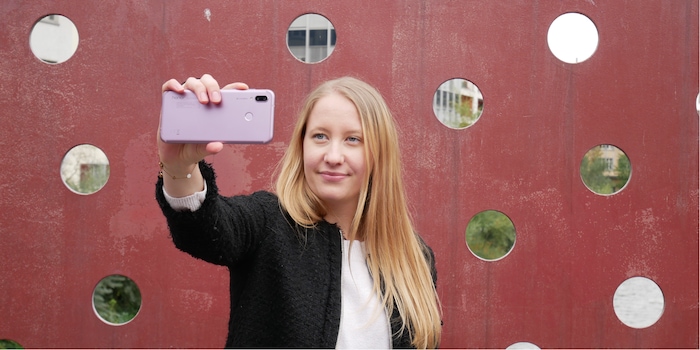
Photo tips to up your selfie game
We all take selfies once in a while. But there are a few golden rules to follow to avoid a photographic faux pas. Here are five tips for superb selfies.
There are too many disastrous selfies out there. Prevent hall of shame-worthy snaps with my rundown of the most common selfie mistakes and tips for avoiding them.
Distortion = disaster
Smartphone cameras have a short focal length, resulting in wide-angle photos. This means that the camera captures a lot of your subject, which can easily lead to distortion – particularly problematic when it comes to selfies. The closer you are to your subject – your own face when taking a selfie – the more distortion there is. This can suddenly make your nose look massive because of the wide angle.
Use this to your advantage and take your selfie from slightly above. But watch out: the 45-degree Myspace angle is too much of a good thing, so don’t overdo it. For best results, hold your phone slightly above your normal eyeline.
Go easy on the editing
Nearly everyone edits their photos, but less is more when it comes to selfies. Soft focus and too many filters look artificial and overdone. The pre-installed beauty filters on many smartphones should also be used sparingly – you’re better off with the natural look.


Pick the right place
Selfies in the bathroom are a no-no. The background is a crucial element of a good selfie. As selfie cameras capture a lot of the background because of their short focal length, it had better be a good one. The best selfies are taken out in the fresh air, or at least somewhere with natural light. The often artificial, glaring light in a bathroom doesn’t lend itself to post-worthy selfies.
A lot of new phones have a portrait mode, artificially blurring the background and softening your selfie. Don’t take this effect too far though, or you’ll look photoshopped into to your background, as the phone’s bokeh effect is computer-generated.

Selfie with bokeh and sunlight behind the subject.
Keep a steady hand
No-one wants a shaky selfie. That said, it takes a fair bit of skill to take the photo, look at the camera and stay still all at the same time, so I recommend using the hardware button on the side of your phone to release the shutter. It’s even easier if you use a timer – then you don’t have to press a button, which is one less reason for the photo to be blurred. The self-timer also means that you don’t have to think about posing and taking a photo at the same time. All you have to do is give the screen your best smile.
Ditch the dodgy poses
Duckface and pouts have been no-nos for ages. Just don’t do it. Before you upload a selfie to social media, I’d advise always looking at it twice. And check the background – we all know that the internet doesn’t forget.
I won’t give you an example for obvious reasons.
Testing devices and gadgets is my thing. Some experiments lead to interesting insights, others to demolished phones. I’m hooked on series and can’t imagine life without Netflix. In summer, you’ll find me soaking up the sun by the lake or at a music festival.
Practical solutions for everyday problems with technology, household hacks and much more.
Show all